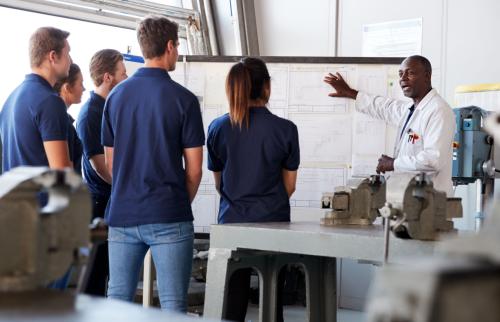Politics and economic policy are intersecting right now in Michigan, with important lessons for the rest of the country. Against the backdrop of the federal government’s rescue of the auto industry, presidential candidates are campaigning in a state that took a huge hit in the recession but has since rallied to post one of the strongest recoveries of any place in the nation.
Michigan is ground zero for the ferment in U.S. manufacturing, the sector that has done so much to power the recovery and a surge in overseas demand for American products. The resilience of the auto industry has played a significant role. American vehicle sales rose to 12.8 million in 2011. The Big Three claimed 47 percent of market share, their best showing since 2008.
Ford earned $20 billion, its best earnings since 1998 and its second-biggest annual profit in the company’s 109-year history. GM regained its position as the world’s largest-volume automaker and notched a record profit of $7.6 billion. Chrysler rebounded from a $652 million loss in 2010 to post a $183 million profit last year, its first full year of positive earnings since 2005.
Even if manufacturing does not regain the outsized share of GDP and employment it once had, it remains powerful engine of innovation, a driver of exports that are taming our trade deficit, and a source of good-paying jobs. Successful manufacturers, from giant auto companies to small machine shops, are pivoting to new lines of business like clean energy, adapting to new technology, and embracing a culture of continuous learning.
In states like Michigan leaders are looking to the future, one driven by innovation. By contrast, our national politics is still stuck in the past. Michigan’s GOP primary contest makes this all too clear.
When the leading GOP candidates talk about manufacturing in Michigan, they are usually squabbling over the wisdom of the auto industry bailout. This argument over counterfactuals (would the industry have bounced back without the bailout? How fast?) misses the point – what will the candidates do to make sure that American manufacturing stays strong?
When they do get around to answering that question, Governor Romney and Senator Santorum put forward proposals that show they are only partly listening to what the makers and innovators really need now.
In a speech last week to the Detroit Economic Club, Senator Santorum pledged to eliminate taxes on manufacturers and allow companies to repatriate profits tax free if they invest that money in plants and equipment. He also promised a 20%, permanent R&D tax credit. Governor Romney followed essentially the same script at his own DEC speech this past Friday, although he alluded to the need for greater private-sector investment and the importance of our institutions of higher learning. But, fundamentally, the focus of both candidates’ announced plans is on lowering taxes.
Certainly, manufacturers are very happy to pay lower taxes and welcome more support for research. But 21st century manufacturing needs a lot more to flourish – and some of that has to come from government.
At a forum on innovation in Washington earlier this month, the chief executives of GE, Dow Chemical and Boeing mentioned tax policy, but they also pointed out the importance of immigration, education (especially in science, technology, engineering and math), attracting foreign direct investment, and the cut-and-invest policies in the deficit commission report. They also stressed the importance of learning from Germany and its interplay of universities, research centers, firms, and workers.
The federal government should be asking the important questions: What do companies and workers need to flourish in an economy driven by production and exports? What are the market gaps in providing capital, or applied innovation, or worker training? How can federal policies galvanize the talents of states and metros where industries are located?
Manufacturers know you can’t get into overdrive if you’re stuck in reverse. As Governor Romney and Senator Santorum travel through Michigan and other states, they should focus on what matters to the people who are driving the recovery and explain how they will deliver. They should aspire to collect ideas, not just delegates.



Commentary
GOP Candidates Don’t Get Michigan (and Manufacturing)
February 25, 2012